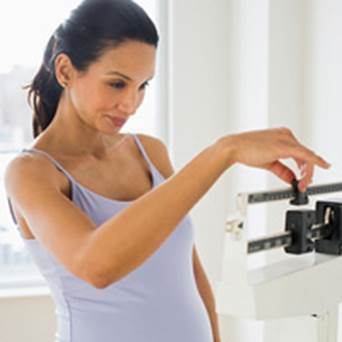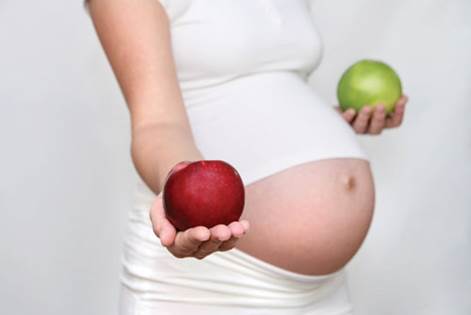Proper nutrition during pregnancy is shown
in the sufficient weight gain of pregnant women.

During
pregnancy you should gain about 10-12 kg.
During pregnancy, many women think that
it’s better to eat as much as possible and the more you eat, the bigger and
stronger your child is. But the fact is different from what we think. Proper
nutrition during pregnancy is shown in the sufficient weight gain in women in
order to make both mother and child healthy, avoid health complication
happening to mother’s and child’s health due to gaining too little or too much
weight compared to expert’s recommendation.
A proper level of weight gain during pregnancy
While being pregnant, woman’s body has many
changes: the increase in the demand of energy and nutrients, in intestinal
absorption; changes in basic transformation, in the hormones inside the body
that lead to loss of appetite in one or several dishes, nauseate, vomit,
heartburn, constipation.
Good nutrition during pregnancy helps to
ensure the health for women while being pregnant, giving birth and raising the newborn.
The fact that mom is provided with sufficient nutrients will guarantee the
better development of the baby and prevent some disabilities.
These changes will little or much affect
the weight gain of pregnant women. Therefore, after “morning sickness” period
with thousands of unpleasant symptoms, women can’t gain weight, even lose
weight. They have eaten uncontrollably and this leads to gaining lots of
weights without estimating the problems that may happen to the mother and
child’s health such as: obesity of mothers after giving birth, difficulties
during giving birth due to the big size of the baby: prolonged labor, difficulty
in giving birth because of the big shoulders, having a caesarean, injuries,
birth asphyxia.
To prevent these, scientists have
recommended pregnant women gain weight properly according to the BMI (body mass
index) of themselves before giving birth.
More
specific
The recommended sufficient weight gaining
during pregnancy is about 10-12kg. In the first 3 months: the weight gain is 0
or 1 kg; the next 3 months is 4-5 kg; the last 3 months is about 5-6 kg. During
the last 6 months, the weight gain for each month less than or equal to 1 kg is
little weight gain.
Proper nutrition during pregnancy
Proper nutrition during pregnancy is shown
in the sufficient weight gain of pregnant women during pregnancy. Daily meals
need to be chosen and balanced enough to provide sufficient energy and
essential substances for the development of the baby such as protein, iron,
folic acid…

The
total amount of energy provided throughout pregnancy is 55,000 kcal to supply
for the formation of a fetus.
Energy
The total amount of energy provided
throughout pregnancy is 55,000 kcal to supply for the formation of a new born
baby with a weight of 3-3.4 kg, assemble 0.9kg of protein, 3.8 kg of fat and
serve the transformations in the mother’s body. Therefore, pregnant women need
to be provided more 350 kcal besides when not being pregnant.
According to that, 350 kcal is equivalent
to 1.5 bowl of rice, 300gr of sweet potatoes, 320gr of fresh rice noodles, 100gr
of vermicelli, 400 ml milk, 1 bowl of sweet soup, or 450 of sweet fruits.
Mothers need to have 1 bowl of noodles, 1
bowl of Noodle with seasoned and sauté beef, a loaf of meat bread; a dumpling,
a pact of chicken and steamed glutinous rice; and they can be provided with an
extra energy of 350 kcal or more. Therefore, having an extra 350 kcal per day
is not difficult to pregnant women.
Protein
Essential amino acids (isoleucine, leucine,
lysine, methionine, phenylalanine, threonine, trytophan and valine) need to be
provided enough in the portion because the body can’t synthesize itself.
The fetus needs a huge amount of protein to
develop and assemble new protein. The amount of protein in addition recommended
by National Institute of Nutrition is 15gr per day: 15 gr of protein is equal
to 70-75 gr of beef, or lean pork, chicken, pork bologna, 85 gr of duck, 90 gr
of pork side, 45 gr of soya bean, or 65 gr of green bean.
Good source of protein for pregnant women
is mainly in daily foods: fish, egg, milk, cheese, grain, nuts.
Iron
Iron deficiency anemia is very common to
pregnant women (30-50%). The results of iron deficiency anemia during pregnancy
are the bad result of pregnancy, low birth weight, and the higher rate of
getting infections in both mom and child.
Pregnant women with iron deficiency
anemia will have symptoms such as pale skin, pale mucus, flabby muscles,
working fatigue and excessive sleepiness. WHO advises pregnant women to supply
30-60mg iron every day. The time to start supplying this is from the moment you
are pregnant to 1 month postpartum; you should drink iron pills between
meals, avoid taking these pills with coffee or milk.
Besides, pregnant women should also eat
rich-iron food such as meats, blood, eggs, liver, heart, and dark green leafy
vegetables. Iron in animal foods is easy to absorb than in plant foods.
Acid
folic (vitamin B9)
Folic acid plays an important role in
deciding the completion fetal neural tube. The consequence of lacking in folic
acid is neural tube defect which causes none skull fetus, encephalocele,
meningeal hernia, cleft vertebrae and spina bifida. And the fetal neural
tube is formed in the first 4 weeks of pregnancy, so the supply of folic acid
need to be done right after pregnancy intentions till the end of the first 3
months of pregnancy.
World-wide researches show that the supply
of folic acid helps to reduce the malformation caused by neural tube defects to
50-70%. Pregnant women should supplement 0.4-0.8mg/day.
Besides, women can find folic acid in beef,
liver, bean sprouts, green vegetables, beet, cauliflowers, soybean… However, you
should note that folic acid will easily be destroyed by sunlight and high
temperature.